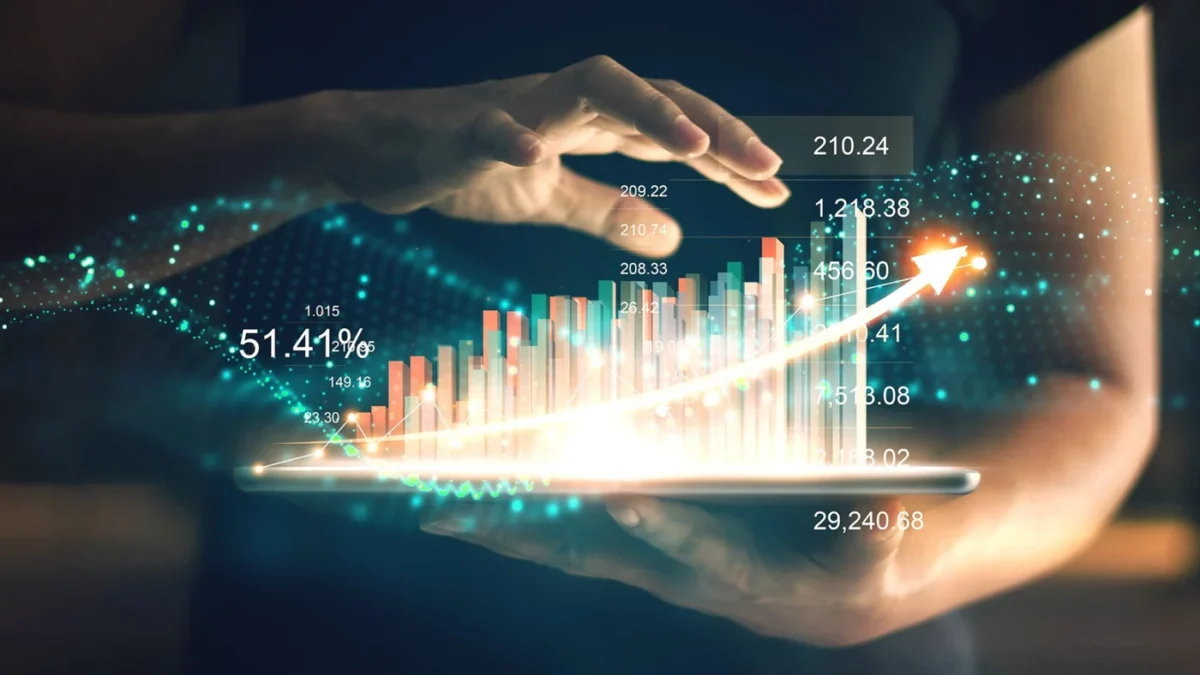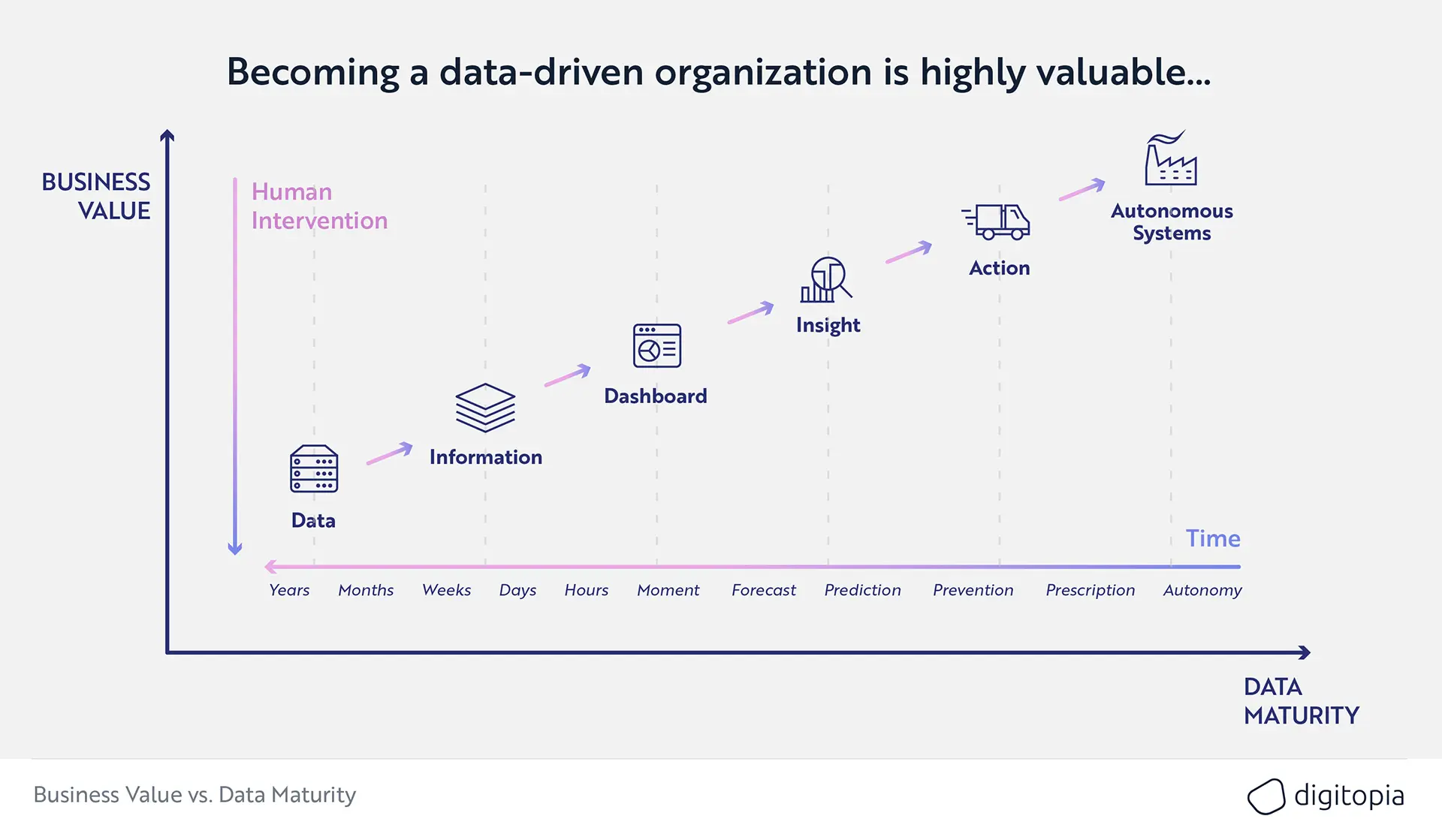
Analytics and intelligence are your most valuable digital superpowers.
The data must be clean, of high quality, consistent, and preferably tagged, so that you can advance your analytics and train your algorithms. Failing to organise data leads to “garbage in, garbage out”, a non-starter for effective digital superpowers. Since the invention of the computers we have created, stored, and processed data. We have digitalised accounting, planning, procurement, banking, brokerage, insurance, retail, and many more industries and functions. This will go on and on…
Meanwhile, the amount of data we are capturing is steadily increasing. All social media content is now parse-able and you can analyse all your corporate documents with natural language processing for instant data capture. The systems you have built in the last few decades generate tons of data while computing power has become ubiquitous, it’s just a matter of having the capabilities to harness these technologies. Data engineering and data science have become the sexiest careers, with AI experts elevating to become the alchemists of the 21st century.
This is far too important to leave it to tech people only.
However, while many surveys show that analytics is a high priority for executives, the interest of some businesspeople is limited, falling back on old habits when it comes to execution, investments, and time allocation. These habits range from using Excel instead of more sophisticated tools and asking their people to create manual reports, to refusing to trust their data fully. If the analytics would conflict with the common wisdom or the expected outcomes, many executives rather trust their own experiences and gut feelings. An excellent example of this mentality is seen in “Big Short” when Michael Burry bet against the whole market of experts who preferred to trust their experience over data trends.
As important as it is to have the right skills and capabilities in place, it is equally important to identify the right use cases, make business leaders aware and curious about it, and foster a culture of analytical awareness.
Knowledge is Power
A microscope is showing you molecular realities about bacteria, materials, and the physical world. Telescopes look deep into the sky, into space, and capture how the universe took shape. Binoculars helped sailors, hunters, generals to conquer new worlds, feed their families or win wars.
In today’s digital enabled world, those devices have turned into analytics tools. Today’s telescopes are forecasting and prediction algorithms, while microscopes are data mining, classification, or segmentation algorithms. Today’s binoculars are natural language processing or optimisation algorithms.
In the world of analytics, it’s not enough to just have the information, time also works against you. In a fast-paced world, analytics must be real-time. There is no value in calculating the campaign for a customer, after she has left your shop in the same way a number-crunching a location service is pointless after the person has moved to another location. It must be on the spot, right now, right there.
Don’t forget the secret sauce.
Human nature likes to be in control, but it’s not scalable. You must be able to let go in order to benefit from machines and algorithms. They are faster, more precise and can process data more efficiently. They are not biased, never tire or get angry. They don’t get emotional, and most importantly, they are scalable.
In theory, everybody should embrace new technologies and accept the benefits. In reality, most people tend to fall back on the familiar, continuing to use tried and trusted (but slower) systems. As Albert Einstein so aptly put it: “We can’t solve problems by using the same kind of thinking we used when we created them.” or “Insanity is doing the same thing over and over and expecting a different result.”
What more evidence do you need? Let’s migrate to the information age, accept the superiority of the machines and realize the value of big data. Embrace the wisdom generated by analytics, make these capabilities your superpowers. You will see the difference and yield the benefits immediately. On digital channels, in mobile applications, along the supply chain and in fast-moving transactions. In any kind of customer interaction that requires the best possible analytics in that moment to provide results to your customer instantly you will find returns on your investment.

Are you a data-driven organisation?
Do you take decision based on evidence or gut feeling? Probably the informed and conscious combination of both is the best approach. Do you take decision individually or ask everybody for input? Knowing what to ask whom, when, where and why is critical.
Do you know what you know? Do you know what you have? How about what you don’t know? These are very difficult questions to answer, but you must to become aware of your situation. Otherwise, you will stay in darkness.
We have discovered a quantitative approach to measure and benchmark your digital maturity across many different aspects. One is your maturity concerning the superpowers discussed in this article. Being data and analytics driven is a key, we tend to call it your “intelligence”. Obviously, more intelligent companies outperform their competitors, and so we believe it is critical to assess your performance in this area. What gets measured gets done, after all.
In February 2022 we published our annual “Digital Maturity” report. It includes our recent findings, learnings, and recommendations from hundreds of engagements and thousands of datapoints from leading executives of leading organisations.
For more information about our Digital Maturity Index service, please follow this link.

